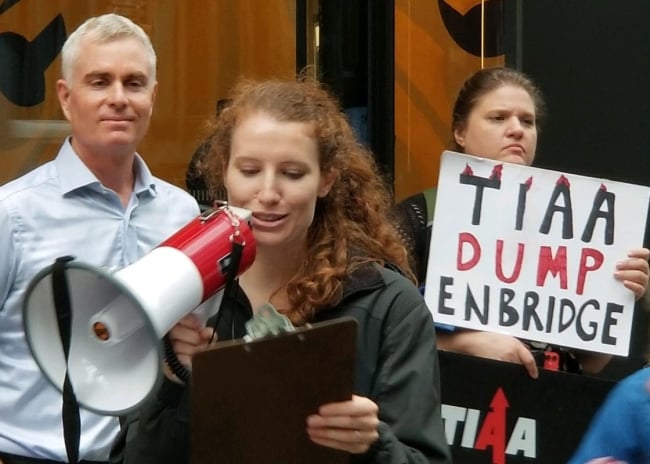You have /5 articles left.
Sign up for a free account or log in.

Activists and TIAA clients protest outside the fund’s Manhattan headquarters in September. Faculty members recently redoubled their efforts to pressure the fund to divest from fossil fuels.
Bill Kish for TIAA-Divest!
Student activists have been demanding that higher education institutions divest their endowments from fossil fuel companies for over a decade. Now, as more institutions move toward sustainable investment, a group of faculty is calling on its pension fund to go green.
About 300 clients of the Teachers Insurance and Annuity Association of America–College Retirement Equities Fund (TIAA), which hundreds of higher education institutions use to invest faculty members’ pensions, are calling on the fund to divest from companies they say contribute to climate change. They are also demanding that TIAA “establish a moratorium on new fossil fuel investments,” “divest its existing fossil fuel investments by 2025” and “stop land grabs leading to deforestation,” according to a press release emailed to Inside Higher Ed.
The group, which consists of faculty members whose pension money is managed by the fund, also filed a formal complaint with the United Nations Principles for Responsible Investment Initiative, asking it to remove TIAA from its list of ethically invested portfolios.
TIAA, which was founded in 1918 to manage the retirement funds of teachers, has grown into one of the largest money managers for employees of educational, cultural and medical organizations, many of them nonprofits.
“Unlike a lot of general banks and retirement funds, TIAA does have a nonprofit bent, a bit of a history of public service,” said Caroline Levine, a literature professor at Cornell University and a TIAA fund participant who signed the complaint to the UNPRI. “What does it mean for me to have had a whole career dedicated to building conditions for students to live happy and flourishing lives and then retire in a way that undermines and makes a mockery of that work?”
In an email to Inside Higher Ed, a spokesperson for TIAA, who preferred not to reveal their gender, rejected the participants’ characterization of its investments and maintained that the fund was in line with UNPRI recommendations.
“TIAA takes sustainable investing seriously,” they wrote. “However, after due consideration, our view is that broad divestment from fossil fuels does not offer TIAA an optimal way to influence the policies and practices of issuers we invest in, nor is it the best means to produce long-term value for our investors and other stakeholders.”
But Bill McKibben, a prominent environmental activist and TIAA member who signed the letter to the UNPRI, argued that divestment is a crucial tool in mitigating the climate crisis.
“It’s about removing the social license of the fossil fuel industries and hampering their access to capital so they can’t expand with new infrastructure, a task that scientists have told us over and over is absolutely essential,” he said.
‘A Logical Next Step’
In the last few years, what was once considered a fringe, radical demand by student activists has started seeing results. Dozens of institutions have pledged to remove endowment investments from coal, gas, shale and other fossil fuel companies. More than 15 percent of the 1,500-plus institutions that have divested from fossil fuels are educational institutions, according to a database maintained by divestment advocates.
Large public systems like the University of California and the University of Michigan are free of fossil fuel holdings. Harvard acquiesced last fall after decades of student activism, a watershed moment for the movement. Two weeks ago, Princeton said it would “dissociate” from fossil fuel companies.
McKibben, the Schumann Distinguished Scholar in Environmental Studies at Middlebury College, is a leading figure in the national divestment movement, which targets college endowments as well as private investors and public pension funds. Middlebury, located in Vermont, was an early adopter, divesting in 2019.
“So many of the institutions we work for have divested,” he said. “TIAA is a logical next step.”
Cornell divested from fossil fuels in 2020 after a successful activist campaign, in which Levine participated. She said the victory at her own institution made her more confident in pushing for divestment from TIAA, a sentiment she’s heard from other faculty supporters of TIAA divestment.
TIAA is a bigger fish than the fossil fuel divestment movement is used to pursuing. Harvard’s endowment, the largest in the country, was $53 billion in 2021; TIAA manages a $1.2 trillion pension fund. Levine doesn’t find that figure intimidating; in fact, she’s compelled by the potentially outsize impact of divesting such a mammoth sum.
“When I realized TIAA had $78 billion invested in fossil fuels, I thought, ‘that’s an order of magnitude bigger than even the largest university endowment. That’s where the fight has to move,’” she said. “Plus, TIAA is investing my money. I’m a customer, which is different from working for an institution … so it felt intolerable to watch that happen without protesting.”
“The fact that all these universities have made this commitment has put TIAA further out on a limb here. And other huge pension funds have divested, too,” McKibben said, referring to New York State’s and Quebec’s public funds. “At a certain point, they lack any explanation other than inertia, that this is just the way they’ve always done it.”
Going for Green, in More Ways Than One
Beyond questions of environmental responsibility, market trends increasingly suggest that fossil fuel divestment may be the soundest financial decision for long-term funds. For over a decade, fossil fuel companies have been some of the worst-performing stocks on the market. As for future prospects, the CEO of ExxonMobil predicted in June that by 2040 every new car sold would be fully electric.
Tom Sanzillo, the director of financial analysis at the Institute for Energy Economics and Financial Analysis, has been consulting with TIAA divestment advocates throughout their current campaign. IEEFA has been advising investors to divest for years, and it released an influential 2018 paper making the financial case for green investing.
Sanzillo said that while the oil crisis created by Russia’s invasion of Ukraine has temporarily boosted the profitability of the fossil fuel sector, the more than decade-long trend has been a downward one—and it’s only going to fall more precipitously as resources like coal become scarcer and alternative energy sources more in demand.
“The fossil fuel industry is under competitive pressure in pretty much every major area where it is doing business, and that’s putting pressure on the long-term outlook of the stock,” Sanzillo said. “So from a financial proposition, it’s pretty clear that fossil fuels are not the place to be.”
The TIAA spokesperson said that if the fund were to sell any of its fossil fuel holdings, it would be done in a “systematic” way that would “uphold our primary obligation of achieving attractive, risk-adjusted returns.”
“Large-scale divestments by simply selling fossil-fuel-generating investments to other companies won’t reduce carbon output. We want to work toward overall solutions,” they wrote. “We are also engaging directly with management of portfolio companies to drive positive change in their environmental policies—again, an action we cannot take if we aren’t invested.”
But Sanzillo said that the fund hasn’t done due diligence when it comes to evaluating its investments in the energy sector. By refusing to seriously investigate the impact of divestment on their portfolios, fund managers are neglecting their fiduciary duty, miring themselves in the past and potentially hurting their funds’ potential earnings for their investors, Sanzillo said.
“I take a slightly different view from advocates who say TIAA should just divest. And I would probably come to the same conclusion. But as a fiduciary, I believe they need to take a really important step, which is to do an exercise and fully consider whether they could meet their targets without fossil fuels in their portfolio,” he said. “I don’t see them taking those steps. To me, that’s not being a responsible fund adviser.”
While the economic case for divestment may be more compelling for financial consultants and fund managers, activists like McKibben and Levine don’t want that argument to eclipse what they see as the urgent moral imperative of reversing the climate crisis.
“If we keep doing what the fossil fuel industry wants, the damage to the climate will continue to increase not linearly, but exponentially,” McKibben said. “Theoretically, what we’re doing at universities is preparing students for the world they will inherit. So there’s something profoundly ironic about investing our pensions in ways that help ensure there will be no world for them to inherit.”
“We have to keep putting pressure” on TIAA, Levine said. “We’re not going to stop until we win.”









